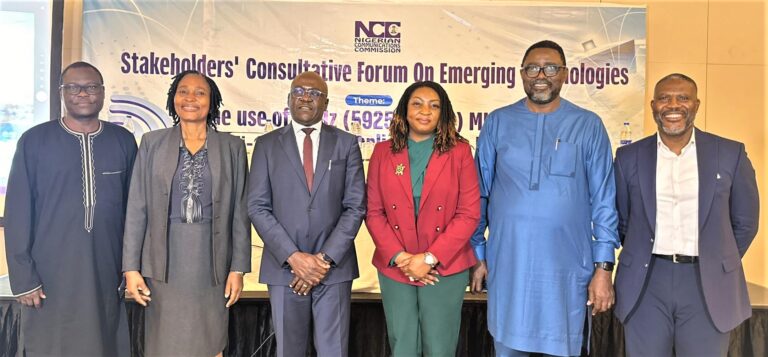The Executive Vice Chairman and Chief Executive Officer (EVC-CEO) of the Nigerian Communications Commission (NCC), Dr. Aminu Maida, has solicited the collaboration of all stakeholders in the telecommunications industry as Nigeria is set to join leading countries globally to leverage the 6GHz band in the current drive to fully digitalize her economy.
The EVC gave the charge in his address delivered at the Annual Stakeholders’ Consultative Forum on Emerging Technologies held on Thursday in Lagos.
Maida, who was represented by the commission’s Executive Commissioner for Technical Services, Engr. Abraham Oshadami, commended the participants at the event, which he described as marking Nigeria’s entry into the group of nations leveraging the 6GHz band for Wi-Fi-6 applications.
The industry expert expressed his enthusiasm for the initiative, noting that since the appointment of President Bola Ahmed Tinubu in 2023, the NCC has been committed to repositioning itself to harness opportunities through strategic focus areas that recognize the diverse perspectives and expectations of all stakeholders, including licensees, industry operators, consumers, and the government.
Maida pointed out that to achieve its strategic goals, NCC had identified key factors, including people, collaboration, data, compliance, and digitalization as very important, stressing that the Commission’s actions are aligned with the Federal Government’s Strategic Blueprint, which emphasizes knowledge, infrastructure, innovation, entrepreneurship, capital, and trade, all aimed at improving telecommunication service delivery in Nigeria.
While harping on the importance of collaboration, the EVC reiterated the NCC’s commitment to participatory regulation and industry-wide consultations and urged the stakeholders to provide their insights on the utilization of the 6GHz band for Wi-Fi-6 and International Mobile Telecommunications (IMT).
Maida noted that the 6GHz band, ranging from 5925 MHz to 7125 MHz, presented a significant opportunity to expand available spectrum, essential for meeting the increasing demand for high-speed internet and advanced applications.
He expatiated: “In line with one of the key factors on collaboration as outlined in our focus areas and the Commission’s traditionally institutionalized policy of participatory regulation and the practice of industry-wide consultations in conducting its regulatory functions, we are here again to elicit your comments and inputs on the use of the 6GHz for Wi-Fi – 6 and International Mobile Telecommunications (MT).
“In line with global best practices, we sincerely believe that our actions must be guided by decisions that take into cognizance the inputs from all stakeholders in the industry. The 6GHz band, spanning from 5925 MHz to 7125 MHz, offers a substantial increase in available spectrum, which is crucial for supporting the growing demand for high-speed internet and advanced applications Wi-Fi plays a crucial role in the distribution of fixed broadband connectivity in homes, offices, and various other environments.
“The vast majority of home internet traffic is connected to the end-user through Wi-Fi. In enterprise settings, Wi-Fi is essential for handling large amounts of data and simultaneously connecting large numbers of devices with improved reliability, higher data throughput, and lower latencies. However, the 5GHz and 2.4GHz that are being used for Wi-Fi (Wi-Fi 5) at the moment are becoming overwhelmed due to an increase in demand for capacity. It is, therefore, imperative to identify other frequency bands to complement the 5GHz and 2.4GHz
“The recently concluded 2023 World Radiocommunications Conference (WRC-23) allocated the 6GHz band for Wi-Fi and IMT applications with different recommendations on how to use the band. This was the outcome of a long study cycle process leading to the decision at the WRC-2023 in Dubai, United Arab Emirates.
“Today, we present to you our thoughts and recommendations on the use of the Spectrum band to get your feedback for informed decision-making”, Maida added.
Photo Caption
L-R: Executive Secretary, Association of Licensed Telecom Operators of Nigeria, Gbolahan Awonuga; Professor of Telecommunications Engineering, Federal University of Technology, Minna, Prof. Caroline Alenoghena; Executive Commissioner, Technical Services, Nigerian Communications Commission (NCC), Abraham Oshadami; Public Policy Manager, Anglophone West Africa, Meta, Sade Dada; Director, Compliance Monitoring and Enforcement, NCC, Efosa Idehen and President, Association of Telecom Companies of Nigeria, Tony Emoekpere, during a Stakeholders’ Consultative Forum on Emerging Technologies hosted by the Commission in Lagos on Thursday






